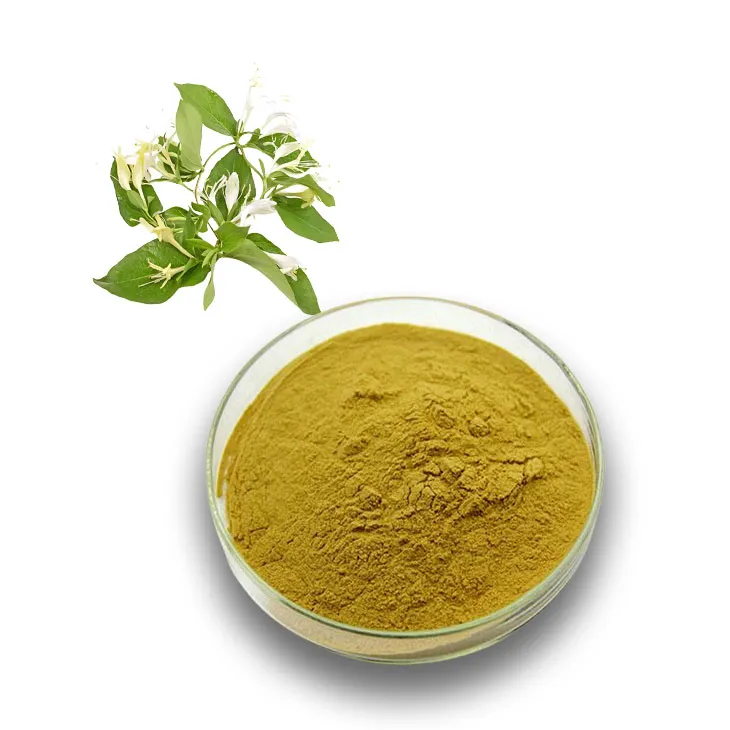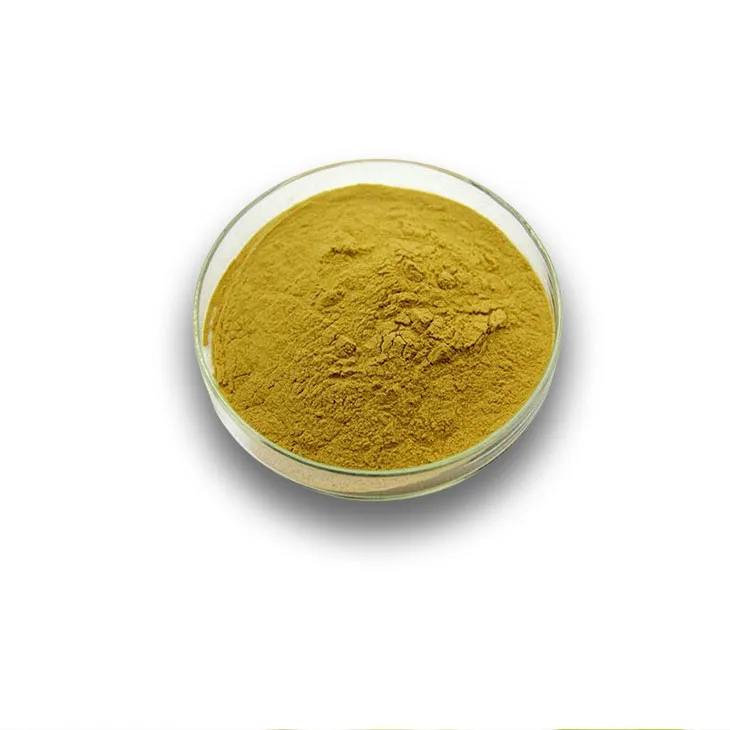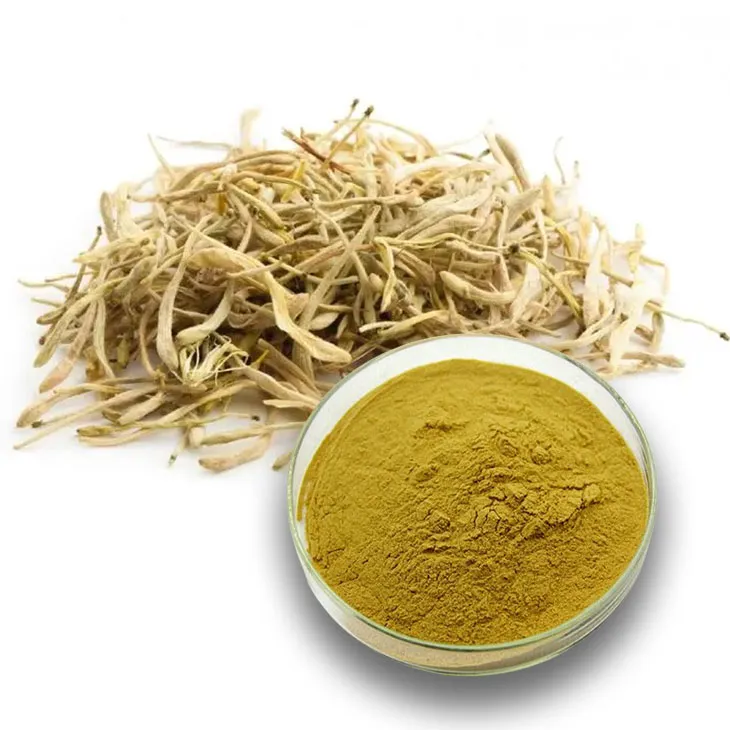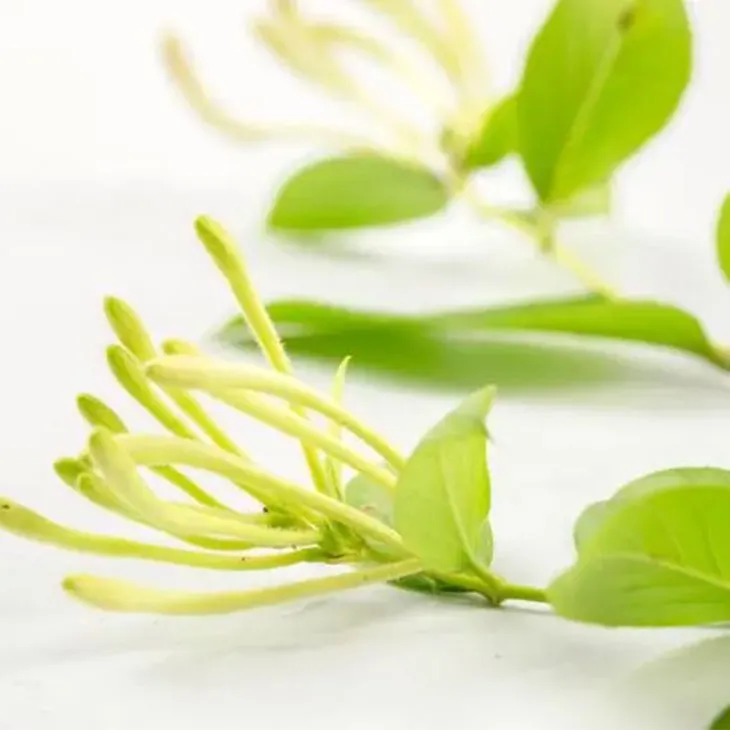- 0086-571-85302990
- sales@greenskybio.com
Seven Trends of Honeysuckle Pollen.
2024-12-17

1. In - depth Exploration of Medicinal Properties
Honeysuckle Pollen has long been recognized for its medicinal value in traditional medicine systems. In recent years, there has been an in - depth exploration of its medicinal properties. Scientists are using advanced research techniques to uncover the various components within the pollen that contribute to its health - promoting effects.
One of the key aspects being studied is its anti - inflammatory properties. Honeysuckle Pollen contains certain bioactive compounds that have shown potential in reducing inflammation in the body. For example, some studies have indicated that these compounds can interfere with the inflammatory pathways at the cellular level, thereby alleviating symptoms associated with inflammatory diseases such as arthritis.
Another area of focus is its antioxidant capacity. The pollen is rich in antioxidants, which play a crucial role in neutralizing free radicals in the body. Free radicals are unstable molecules that can cause damage to cells and DNA, leading to various health problems including aging, cancer, and heart disease. By scavenging these free radicals, Honeysuckle Pollen can help protect the body's cells and maintain overall health.
Furthermore, research is also exploring the potential of honeysuckle pollen in enhancing the immune system. A strong immune system is essential for the body to defend against infections and diseases. Preliminary studies suggest that the pollen may stimulate the production of immune cells, such as lymphocytes and macrophages, which are key players in the body's immune response.

2. Boom in Health - keeping Uses
The understanding of honeysuckle pollen's health benefits has led to a boom in its health - keeping uses. More and more people are incorporating honeysuckle pollen into their daily health regimens.
One popular way is through dietary supplementation. Honeysuckle pollen is available in various forms, such as capsules, tablets, and powders. These supplements are convenient for consumers to take regularly. People who are concerned about their general health, especially those with weakened immune systems or those at risk of chronic diseases, are increasingly turning to honeysuckle pollen supplements as a natural way to boost their health.
In addition to supplementation, honeysuckle pollen is also being used in traditional herbal remedies. For example, it can be brewed into a tea. The process of brewing releases the beneficial components of the pollen into the water, creating a soothing and health - promoting beverage. This tea is often consumed for its potential to relieve stress, improve digestion, and enhance overall well - being.
Moreover, some health spas and wellness centers are incorporating honeysuckle pollen - based treatments into their services. For instance, honeysuckle pollen may be used in facials or body scrubs for its purported skin - nourishing and detoxifying effects. This trend not only showcases the versatility of honeysuckle pollen in health - keeping but also reflects the growing demand for natural and holistic health solutions.

3. New Trend in Beauty and Skin Care
Honeysuckle pollen has emerged as a new trend in beauty and skin care. Its unique properties make it a valuable ingredient in various skin - care products.
For skin hydration, honeysuckle pollen contains natural moisturizing factors that can penetrate the skin's layers and lock in moisture. This helps to keep the skin soft, smooth, and supple. Many moisturizers and creams are now incorporating honeysuckle pollen to provide long - lasting hydration, especially for those with dry or dehydrated skin.
In terms of anti - aging, the antioxidants present in the pollen play a significant role. As mentioned earlier, these antioxidants can combat free radicals that contribute to premature skin aging. By reducing oxidative stress on the skin, honeysuckle pollen can help minimize the appearance of wrinkles, fine lines, and age spots. Consequently, anti - aging serums and creams are increasingly featuring honeysuckle pollen as a key ingredient.
Furthermore, honeysuckle pollen also has anti - bacterial and anti - inflammatory properties that are beneficial for acne - prone skin. It can help reduce inflammation associated with acne breakouts and prevent the growth of acne - causing bacteria. Some facial cleansers and spot treatments are now using honeysuckle pollen to address acne problems in a natural and gentle way.
Another aspect of its use in skin care is in improving skin tone and texture. The nutrients in the pollen can stimulate skin cell renewal, resulting in a more even skin tone and a refined skin texture. This has led to the inclusion of honeysuckle pollen in exfoliating products and masks that aim to rejuvenate the skin.

4. Improvement through Organic Growing
The trend towards organic growing of honeysuckle is having a significant impact on the quality and marketability of honeysuckle pollen.
Organic growing methods ensure that the honeysuckle plants are free from synthetic pesticides, fertilizers, and genetically modified organisms (GMOs). This is important because these contaminants can potentially find their way into the pollen and affect its purity and safety. By using organic farming practices, such as composting, crop rotation, and natural pest control methods, farmers can produce honeysuckle pollen that is of higher quality and more appealing to health - conscious consumers.
Organic honeysuckle pollen is also perceived as more environmentally friendly. Consumers are increasingly aware of the environmental impact of their purchasing decisions, and they are more likely to choose products that are produced sustainably. Organic farming reduces the use of chemical inputs, which helps to protect the soil, water, and biodiversity in the surrounding area.
Moreover, organic growing can enhance the nutritional value of honeysuckle pollen. Studies have shown that plants grown organically may contain higher levels of certain nutrients and bioactive compounds compared to conventionally grown plants. This means that organic honeysuckle pollen may offer even greater health benefits, further driving the demand for this type of pollen in the market.

5. Diverse Utilization in the Food Industry
Honeysuckle pollen has found diverse utilization in the food industry. Its unique flavor and nutritional profile make it an interesting ingredient for various food products.
One of the most common uses is in the production of honey. Honeysuckle pollen is a major source of nectar for bees, and the type of pollen that bees collect can influence the flavor and quality of the honey. Honeysuckle - flavored honey has a distinct, sweet - floral taste that is highly prized by consumers. It can be used as a spread on bread, added to tea or coffee, or used in cooking and baking as a natural sweetener.
In addition to honey, honeysuckle pollen is also being used in the production of confectionery. For example, it can be incorporated into chocolates, candies, and nougats. The floral notes of the pollen add a unique and sophisticated flavor to these sweet treats, appealing to consumers with a taste for something different.
Some food manufacturers are also exploring the use of honeysuckle pollen in beverages. It can be added to fruit juices, smoothies, and even alcoholic beverages like cocktails. In beverages, honeysuckle pollen not only imparts its flavor but also provides some nutritional value, such as antioxidants and vitamins.
Furthermore, there is potential for honeysuckle pollen to be used in functional foods. Functional foods are designed to provide additional health benefits beyond basic nutrition. Given the known health - promoting properties of honeysuckle pollen, it could be added to products such as energy bars, breakfast cereals, or dietary supplements to enhance their functionality.
6. Globalization of its Market
The globalization of the honeysuckle pollen market is an emerging trend that is opening up new opportunities for producers and consumers alike.
With the increasing awareness of the health and beauty benefits of honeysuckle pollen around the world, the demand for this product is growing globally. In Asia, where traditional medicine has long recognized the value of honeysuckle, the market for honeysuckle pollen is well - established. However, in recent years, Western countries have also shown a growing interest in honeysuckle pollen, driven by the trend towards natural and alternative health products.
Improvements in transportation and logistics have made it easier to ship honeysuckle pollen from its production areas to international markets. This has enabled producers in regions where honeysuckle is abundant, such as certain parts of China, to export their products to a wider range of countries. At the same time, consumers in different parts of the world can now access high - quality honeysuckle pollen products more easily.
Globalization has also led to increased competition in the honeysuckle pollen market. Producers are now competing not only on a local or national level but also on an international scale. This has spurred innovation in product development, marketing, and quality control. For example, producers may need to adapt their products to meet the different regulatory requirements and consumer preferences in various countries.
Another aspect of globalization is the exchange of knowledge and research about honeysuckle pollen. Scientists from different countries are collaborating to further study the properties and applications of honeysuckle pollen, which in turn can contribute to the development of new products and the expansion of the market.
7. Pursuit of Sustainable Development
The pursuit of sustainable development is a crucial trend in the honeysuckle pollen industry.
As the demand for honeysuckle pollen increases, it is essential to ensure that its production is sustainable in the long - term. This involves conserving the natural habitats of honeysuckle plants, which are often found in wild or semi - wild areas. Protecting these habitats not only ensures the continued availability of honeysuckle pollen but also helps to preserve the biodiversity of the ecosystems where the plants are located.
Sustainable harvesting practices are also being promoted. Over - harvesting can deplete the honeysuckle population and disrupt the ecological balance. Therefore, guidelines are being developed to ensure that only a sustainable amount of pollen is collected each year. This may involve setting quotas, regulating the harvesting season, and using proper harvesting techniques to minimize damage to the plants.
Furthermore, the industry is also looking at ways to reduce its environmental impact throughout the production process. This includes reducing waste, conserving energy, and using more sustainable packaging materials. By adopting these sustainable practices, the honeysuckle pollen industry can not only meet the current demand but also ensure its viability for future generations.
FAQ:
What are the main medicinal properties of honeysuckle pollen?
Honeysuckle pollen has various medicinal properties. It may have anti - inflammatory effects, which can help reduce inflammation in the body. It also might possess antioxidant properties, which can combat free radicals and protect cells from damage. Additionally, it could have certain antibacterial qualities, potentially helping the body fight off harmful bacteria.
How is honeysuckle pollen used in health - keeping?
Honeysuckle pollen can be used in health - keeping in multiple ways. It can be consumed as a dietary supplement. For example, it may be taken in the form of capsules or added to smoothies. Some people believe it can boost the immune system, improve digestion, and enhance overall energy levels when used regularly in a proper way.
What makes honeysuckle pollen a new trend in beauty and skin care?
Honeysuckle pollen is becoming a new trend in beauty and skin care due to its potential benefits for the skin. It may contain nutrients that can nourish the skin, making it look more radiant. Its antioxidant properties can help prevent premature aging of the skin by reducing the damage caused by environmental factors. It may also have a soothing effect on irritated skin.
How does organic growing improve honeysuckle pollen?
Organic growing improves honeysuckle pollen in several aspects. Firstly, without the use of synthetic pesticides and fertilizers, the pollen is less likely to be contaminated, ensuring its purity. Organic growing also promotes a more natural and balanced growth environment for the honeysuckle plants, which may result in pollen with better quality and more potent beneficial properties.
What are the diverse utilizations of honeysuckle pollen in the food industry?
In the food industry, honeysuckle pollen has diverse utilizations. It can be used as a natural flavor enhancer, adding a unique and pleasant taste to various foods. It can also be incorporated into baked goods, such as cakes and bread, for added nutritional value. Some food products may use it as an ingredient in health - conscious formulations.
Related literature
- Medicinal Properties of Honeysuckle and Its Components"
- "Honeysuckle in Health - Keeping: A Comprehensive Review"
- "The Role of Honeysuckle Pollen in Skin Care"
- "Organic Growing and the Quality of Honeysuckle Pollen"
- "Utilization of Honeysuckle Pollen in the Food Industry"
- ▶ Hesperidin
- ▶ Citrus Bioflavonoids
- ▶ Plant Extract
- ▶ lycopene
- ▶ Diosmin
- ▶ Grape seed extract
- ▶ Sea buckthorn Juice Powder
- ▶ Fruit Juice Powder
- ▶ Hops Extract
- ▶ Artichoke Extract
- ▶ Mushroom extract
- ▶ Astaxanthin
- ▶ Green Tea Extract
- ▶ Curcumin
- ▶ Horse Chestnut Extract
- ▶ Other Product
- ▶ Boswellia Serrata Extract
- ▶ Resveratrol
- ▶ Marigold Extract
- ▶ Grape Leaf Extract
- ▶ New Product
- ▶ Aminolevulinic acid
- ▶ Cranberry Extract
- ▶ Red Yeast Rice
- ▶ Red Wine Extract
-
Citrus Aurantii Extract
2024-12-17
-
Purple Sweet Potato Extract
2024-12-17
-
Curcuma Longa Extract
2024-12-17
-
Berberis aristata Extract
2024-12-17
-
Boswellia Serrata Extract
2024-12-17
-
Ginger Extract
2024-12-17
-
Moringa powder
2024-12-17
-
Elderberry Extract
2024-12-17
-
Honeysuckle Pollen
2024-12-17
-
Aminolevulinic acid
2024-12-17




















